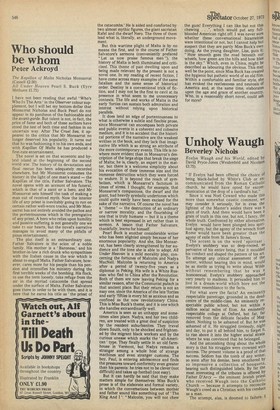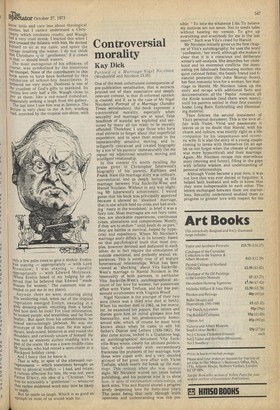Unholy Waugh
Beverley Nichols
Evelyn Waugh and his World, edited bY David Pryce-Jones (Weidenfeld and Nicolson £3.75).
"If Evelyn had been offered the choice of being black-balled by White's Club or excommunicated from the Roman Catholic church, he would have opted for excommunication at the drop of a cardinal's hat."
Since it was Noel Coward who made this more than somewhat caustic comment, we may consider it seriously, for in even the lightest of the Master's asides there was a grain of truth. And there would have been a grain of truth in this one, but not, I fancy, the whole truth. Confronted by either alternative,. Evelyn would have been plunged into spiritual agony, but the agony of the wrench from Rome would have been greater than the agony of exile from St James's Street. The accent is on the word ' spiritual Evelyn's snobbery was so deep-rooted, $o pervasive of his entire being, that it moulded his conduct and shaped the pattern of his art. To attempt any critical assessment of the writer, without bearing this in mind, would be as sterile as trying to write about Wilde without remembering that he was a homosexual. Evelyn's snobbery approached very pearly to madness. It persuaded him to live in a dream-world which bore not the remotest resemblance to the facts.
For what were the facts? An eminentlY respectable parentage, grounded in the dead centre of the middle-class. An eminently respectable public school, but not within a million social miles of Eton. An eminently respectable college at Oxford, but far, far removed from the delicate facades of Magdalen. Nothing to be ashamed of. But he was
ashamed of it. He struggled tirelessly, night and day, to put it all behind him, to forget it to rise above it into the higher social strata where he was convinced that he belonged. And the astonishing thing about the whole story is that his struggles were crowned with success. The present volume is a proof of that • success. Seldom has the tomb of any writer, so soon after his demise, been smothered bY
so impressive a collection of bouquets,
bearing such distinguished labels. By far the most interesting of the tributes is offered, by Father D'Arcy — the eminent Jewish priest who received Waugh into the Catholic Church — because it attempts to reconcile Waugh's creed as a Christian with his conduct as a man. The attempt, alas, is doomed to failure. 1
k.rlow little and care less about theological niceties, but I cannot understand a Chrishianity which condones cruelty, and Waugh ad a very cruel streak. I learned this when I ?nee crossed the Atlantic with him. He invited nimself to sit at my table, and spent the Voyage insulting the waiter. I do not think that Christians or ' gentlemen,' if it comes to that — should insult waiters.
The most outrageous of his offences, of Course, was symbolised by the notorious Lear-trumpet. None of the contributors to this °rook seem to have been bothered by this exhibition of school-boy beastliness. It bothered me very much. Deafness is one of the cruellest of God's gifts to mankind. Its victims live only half a life. Waugh chose to Jeer at them, like a red-nosed comedian, desperately seeking a laugh from the gallery.
The last time I saw him was in Jamaica. The Picture is very clear to me. A hot, winding road, scorched by the tropical sun-shine, with
Only a few palm trees to give it shelter. Evelyn was staying — appropriately — with Lord trownlow; I was staying — equally appropriately — With Edward Molyneux. (When Evelyn heard of my lodging he observed that he believed that Edward "made blouses for women." The comment was intended to put me in my place).
Anyway, there we were, motoring along this sweltering road, when out of the tropical vegetation emerged Evelyn, sweating in a Pink dressing-gown, returning from a bathe. And how does he look? For your information, he looked purple, and breathless, and far from healthy. But apart from his unhealthiness, he looked excruciatingly plebeian. He was the Prototype of the Butlin man. He was squat, square, snub-nosed, blistered at and round the Shoulders, and curiously unsure of himself. He ‘vas not an eminent author residing with a Deer of the realm. He was a lower-middle-class Mr Snooks, who had rented a semi-chalet at a alackpool holiday camp.
And I fancy that he knew it.
That is why, in spite of the aforesaid outrageousness — which sometimes brought us near to physical conflict — I had, and retain, a, curious affection for him. He was not, pace Father D'Arcy, my idea of a 'Christian.' Nor Was he noticeably a ' gentleman ' — whatever that rather mildewed word may now be likely to imply.
But he made us laugh. Which is as good an epitaph as most of us would wish for.



































 Previous page
Previous page